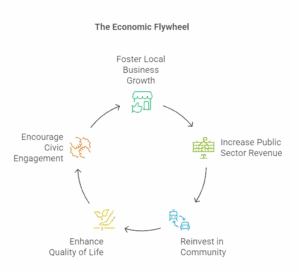Before “economic flywheel” became a favorite buzzword in business circles, local governments had already been putting the concept into practice. Long before TED Talks and tech blogs caught on, public sector leaders understood something fundamental: when local businesses thrive, communities—and their budgets—do too.
That was the original flywheel. And it still works.

A Simple, Powerful Cycle
Local businesses generate revenue for local governments through property taxes, sales taxes, service charges, permits, and many other avenues. In turn, those revenues fund essential public services—think police departments, park improvements, transit systems. Better services enhance quality of life, attract new residents and visitors, and fuel even more local commerce. It’s a virtuous cycle of reinvestment, and when working properly, it’s one of the most effective tools for building community resilience.
In fact, the most vibrant local economies we’ve seen weren’t the result of luck or one-off grants—they were the product of intentional investment and long-term vision.
Cities cultivated strong commercial districts, reinvested tax dollars in infrastructure, public safety, and local amenities, and created welcoming environments for entrepreneurs. And in return? More activity, more revenue, more reinvestment. The flywheel spun faster.
Let’s Talk About Main Street
Take a walk through any thriving downtown and you’ll see the flywheel in action. Streetlights and sidewalks funded by sales taxes. Bustling cafés and boutiques bringing in more foot traffic. Safe neighborhoods and reliable public transit, making it easy to spend an afternoon—or a paycheck—close to home.
Public dollars invested wisely have a multiplying effect. They create the conditions that inspire entrepreneurs, attract small businesses, and encourage local reinvestment. It’s economic development that feeds itself.
The Disruptions Are Real—But So Are the Opportunities
Of course, today’s reality looks a little different. Remote work has shifted where people live and spend their money. E-commerce giants have reshaped consumer habits. And as traditional revenue streams grow more volatile, some communities are watching the flywheel slow down or stall.
But here’s the thing: we don’t need to reinvent the wheel; we just need to give it a fresh spin.
This is where public sector innovation comes in. With the right mix of technology, inclusive procurement strategies, and adaptive policymaking, local governments can reignite the local revenue flywheel.
Our team at Euna Solutions sees agencies every day using digital procurement tools to notify local suppliers of relevant bids to increase local reinvestment and support. Governments use grant funding platforms to support community nonprofits. Cities turn data into smarter, more equitable investment decisions.
More Than a Budget Line—It’s a Community Strategy
Revitalizing the local economic flywheel isn’t just a budget strategy—it’s a statement of values. It says: We believe in our small businesses. We believe in the power of local reinvestment. We believe in resilient, thriving communities.
And during Small Business Week, there’s no better time to double down on that belief.
Let’s not just celebrate small businesses, let’s build systems that support them, reinvest in them, and make them central to our economic future.
Because when we get the flywheel turning, everybody wins.
Contact us today to learn more about our solutions and how we can support your success.
Euna Solutions, a leader in government technology, designs, builds, delivers, and supports trusted procurement, payments, grants management, and budgeting software for the public sector.